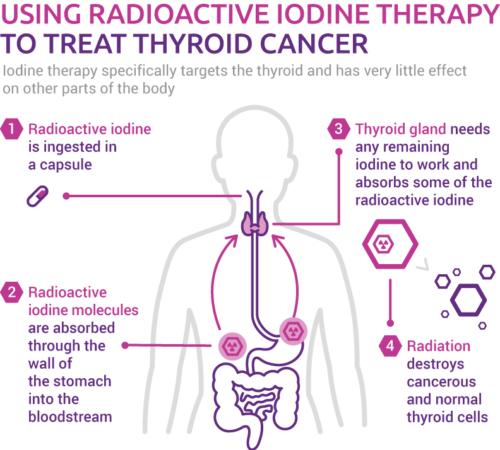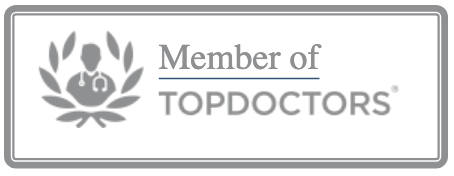Thyroid Cancer
Thyroid Cancer Treatments
Radioactive iodine therapy for thyroid cancer
The mainstay of thyroid cancer treatments (for most types of thyroid cancer) is surgery. Usually all, or part, of the thyroid gland is removed. Many patients will require thyroid hormone replacement after surgery.
Radioactive iodine treatment is administered to the majority of patients with thyroid cancer after surgery. The purpose of radioactive iodine treatment is to eradicate any remaining cancer cells left behind after surgery, minimising the risk of cancer recurrence, and increasing cure rates.

Radioactive iodine is also useful for the detection and treatment of any cancer cells that may remain.
The thyroid cancer cells absorb the radioactive iodine which will help to destroy them. Radioactive iodine has very little effect on other parts of the body since other cells do not absorb iodine as much as the thyroid cells. Radioactive iodine treatment can be repeated if further tests show that cancer cells are still present.
Preparing for radioactive iodine treatment
Diet
Before treatment you may be asked to start eating a low iodine diet for 7-10 days, as too much iodine in your body will make the treatment less effective. You will be given advice about which foods to avoid, but you should not have:
- fish and seafood
- table salt that has had iodine added
- cough medicines
- foods that contain the pink food colouring E127, such as salami, and glace cherries.
- vitamin supplements that contain iodine.
You should also try to cut down on the amount of dairy products that you eat, as these also contain some iodine. This includes foods such as:
- milk and milk products
- eggs
- cheese.
A good diet sheet for a low iodine diet is at https://www.macmillan.org.uk/information-and-support/treating/radiotherapy/radioactive-iodine
In the two days prior to administration of radioactive iodine you will be have an injection of a hormone called TSH. This hormone, also known as thyrotropin alfa (Thyrogen®), is given as two injections into a muscle, usually in the buttock. It allows you to carry on taking your hormone replacement tablets and avoid the symptoms of thyroid hormone withdrawal.
If you are taking thyroxine, this should be continued throughout the treatment. Most people find that stopping the hormone replacement therapy makes them feel very tired, so nowadays we avoid thyroxine withdrawal when possible.
Side effects
Fortunately, radioactive iodine has very few side effects. The treatment is given by mouth as a capsule which you swallow. Your body will be radioactive for about two weeks in total. Most of the radiation will be excreted from your body in your urine, blood, saliva and sweat in the first few hours after the treatment. Usually the radiation levels will be low enough to discharge you from the hospital the day after when the radiation has reduced to a safe level.
Very rarely, you may have neck tenderness, tiredness and/or nausea after having radioactive iodine treatment. If these side effects occur, let your nurse or doctor know, as medicines can be prescribed to help.
Safety measures
Because of the possibility of radiation exposure to the hospital staff and your friends or relatives, certain safety measures are taken while the radioactive iodine is still in your body.
The staff looking after you will explain these restrictions to you in detail before you start your thyroid cancer treatments. Each hospital has different routines, and it is worth visiting beforehand to discuss the procedure with the nursing and medical staff. During the treatment you will be admitted to a special radiation treatment room.
Following discharge from the hospital your body will still have residual low levels of radiation for another 7-10 days. During this time you will be advised to avoid young children under the age of 5 and anyone who is pregnant.
What will happen
You will be admitted to a single room, with on-suite bathroom.
Lead screens may be used to reduce any radiation of visitors or staff. Visitors will be restricted, and only allowed to stay in the room or sit at the end of the bed for a short time, particularly in the first 24 hours.
You will be able to talk to staff outside the room through an intercom or telephone.
Children under 18 and women who are pregnant will not be allowed to visit.
Staff and visitors will be asked to stand away from your bed to reduce their exposure to the rays.
An instrument called a Geiger counter will be used to monitor the level of radiation in the room. The nurses may wear a small radiation counter.
You will probably be in the single room for a short time, usually only one or two days. You can bring books and magazines into your room, watch TV or listen to the radio. You can bring in your phone or laptop, but we recommend covering these with cellophane to avoid contamination with radiation.
Sometimes these safety measures and visiting restrictions can make you feel a bit isolated, frightened and depressed at a time when you want people around you. If you have these feelings it is important to let the staff looking after you know. People are different in the way they handle their fears; some find it easier to know everything about their treatment, while others prefer to know as little as possible. If you want any explanations, the staff on the ward will be happy to help you. It often helps to bring your fears or worries into the open by talking to the staff or to family and friends.
Fertility and breast feeding
It is advisable not to become pregnant, or father a child, while being treated for thyroid cancer, and for six months afterwards. If you are pregnant you cannot be given radioactive iodine treatment. For this reason, you should tell your doctor if you are, or think you might be, pregnant. Your fertility should not be affected by radioactive iodine treatment, although there is a small risk if you need to have repeated treatments. If you are breastfeeding, you should stop a couple of days before you are treated with radioactive iodine. Although it is not safe to start breastfeeding again after your treatment, it will be safe for you to do so after future pregnancies.
Going Home: Are You Really Radioactive?
Yes, but not in the way you might think.
For about five days after the treatment, you’ll emit small amounts of radiation. That doesn’t mean you glow in the dark or pose a serious danger to others—but there are a few common-sense precautions we recommend.
- Keep a metre’s distance from other adults for prolonged periods
- Avoid close contact with pregnant women and young children (under 5)
- Sleep in a separate bed for a few days
- Flush the loo twice, wash hands thoroughly, and keep good hygiene
Travelling home? You can take a train or car. If using a train, choose a quiet carriage and keep some distance from other passengers. In a car, just sit in the back seat.
It’s important that you don’t fly during the four days following your treatment, because of the close proximity to other passengers.
Think of yourself like the “Ready Brek man”—giving off a faint glow that fades over a few days. After five days, you’re considered safe.
Hotel? Hospital? Spa? Where Should You Stay?
Some patients choose to stay in a hotel or even book into a spa for a few days if they live with young children or are particularly anxious about radiation exposure.
Here are a few workarounds that have worked brilliantly:
- Stay with family or friends where you have your own space
- Book a local hotel for 2–3 nights
- Ask to stay in hospital for an extra night (subject to insurance approval)
- Treat yourself—a few have even turned it into a mini-retreat!
What Does Radioactive Iodine Treatment Cost?
The self-pay cost is around £9,000. If you have private health insurance, it’s often covered, but we always recommend checking with your provider.
Unlike the NHS, where waiting lists can delay treatment for weeks, private care allows us to:
- Organise your consultation quickly
- Get you on the treatment pathway during your two-week diet
- Ensure you have one point of contact throughout
Still Have Questions?
You’re not alone. Most patients come to me feeling confused, concerned, or overwhelmed—especially if they’ve been told conflicting information elsewhere.
You can be seen by video consultation from anywhere in the UK (or internationally). We’ll go over your diagnosis, your options, and your next steps. No pressure. Just clear, honest advice.
External radiotherapy treatment is only used for a minority of thyroid cancer patients. If this treatment is required, then usually Prof Nutting uses a new type of radiotherapy called IMRT. This may be given as part of a clinical trial currently going on at The Royal Marsden Hospital. The use of IMRT is thought to allow a better quality of radiotherapy and avoid damage to organs such as the spinal cord in the neck.




